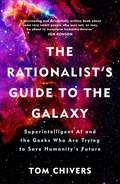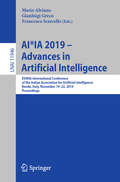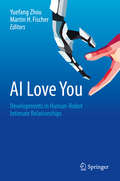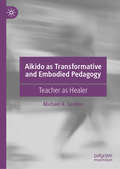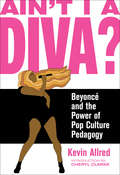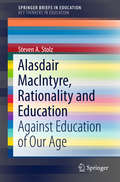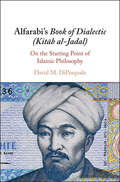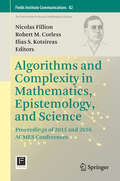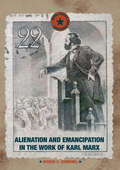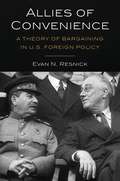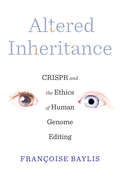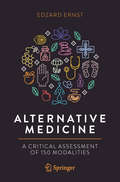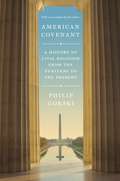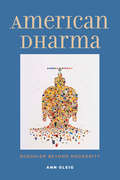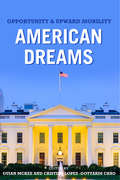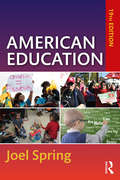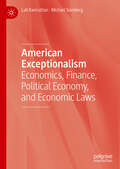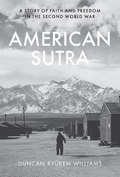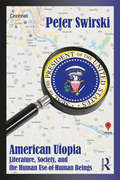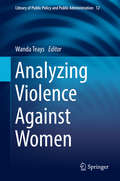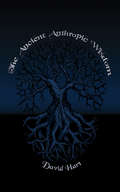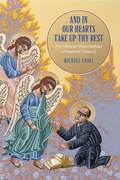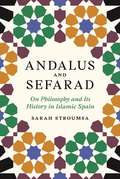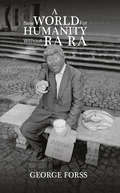- Table View
- List View
The AI Does Not Hate You: Superintelligence, Rationality and the Race to Save the World
by Tom Chivers'A fascinating and delightfully written book about some very smart people who may not, or may, be about to transform humanity forever' JON RONSONThis is a book about AI and AI risk. But it's also more importantly about a community of people who are trying to think rationally about intelligence, and the places that these thoughts are taking them, and what insight they can and can't give us about the future of the human race over the next few years. It explains why these people are worried, why they might be right, and why they might be wrong. It is a book about the cutting edge of our thinking on intelligence and rationality right now by the people who stay up all night worrying about it.Along the way, we discover why we probably don't need to worry about a future AI resurrecting a perfect copy of our minds and torturing us for not inventing it sooner, but we perhaps should be concerned about paperclips destroying life as we know it; how Mickey Mouse can teach us an important lesson about how to program AI; and how a more rational approach to life could be what saves us all.
AI*IA 2019 – Advances in Artificial Intelligence: XVIIIth International Conference of the Italian Association for Artificial Intelligence, Rende, Italy, November 19–22, 2019, Proceedings (Lecture Notes in Computer Science #11946)
by Mario Alviano Gianluigi Greco Francesco ScarcelloThis book constitutes the proceedings of the XVIIIth International Conference of the Italian Association for Artificial Intelligence, AI*IA 2019, held in Rende, Italy, in November 2019. The 41 full papers were carefully reviewed and selected from 67 submissions. The papers have been organized in the following topical sections: Knowledge Representation for AI, AI and Computation, Machine Learning for AI, and AI and Humans.
AI Love You: Developments in Human-Robot Intimate Relationships
by Martin H. Fischer Yuefang ZhouUsing an interdisciplinary approach, this book explores the emerging topics and rapid technological developments of robotics and artificial intelligence through the lens of the evolving role of sex robots, and how they should best be designed to serve human needs. An international panel of authors provides the most up-to-date, evidence-based empirical research on the potential sexual applications of artificial intelligence. Early chapters discuss the objections to sexual activity with robots while also providing a counterargument to each objection. Subsequent chapters present the implications of robot sex as well as the security and data privacy issues associated with sexual interactions with artificial intelligence. The book concludes with a chapter highlighting the importance of a scientific, multidisciplinary approach to the study of human - robot sexuality. Topics featured in this book include: The Sexual Interaction Illusion Model. The personal companion system, Harmony, designed by Realbotix™. An exposition of the challenges of personal data control and protection when dealing with artificial intelligence. The current and future technological possibilities of projecting three-dimensional holograms. Expert discussion notes from an international workshop on the topic. AI Love You will be of interest to academic researchers in psychology, robotics, ethics, medical science, sociology, gender studies as well as clinicians, policy makers, and the business sector.
Aikido as Transformative and Embodied Pedagogy: Teacher as Healer
by Michael A. GordonDrawing on the author’s lifelong practice in the non-competitive and defensive Japanese art of Aikido, this book examines education as self-cultivation, from a Japanese philosophy (e.g. Buddhist) perspective. Contemplative practices, such as secular mindfulness meditation, are being increasingly integrated into pedagogical settings to enhance social and emotional learning and well-being and to address stress-induced overwhelm due to increased pressures on the education system and its constituents. The chapters in this book explore the various ways, through the lens of this non-violent relational art of Aikido, that pedagogy is always something being practiced (on the level of psychological, somatic and emotional registers) and thus holding potential for transformation into being more relational, ecological-minded, and reflecting more ‘embodied attunement.’ Positioning education as a practice, one of self-discovery, the author argues that one can approach personal development as engaging in a spiritual process of integrating mind and body towards full presence of being and existence.
Ain't I a Diva?: Beyoncé and the Power of Pop Culture Pedagogy
by Kevin Allred“[Allred] interrogates Beyoncé’s music and videos to explore the complicated spaces where racism, sexism, and capitalism collide.” —Kirkus ReviewsIn 2010, Professor Kevin Allred created the university course “Politicizing Beyoncé” to both wide acclaim and controversy. He outlines his pedagogical philosophy in Ain’t I a Diva?, exploring what it means to build a syllabus around a celebrity. Topics range from a capitalist critique of “Run the World (Girls)” to the politics of self-care found in “Flawless”; Beyoncé’s art is read alongside black feminist thinkers including Kimberlé Crenshaw, Octavia Butler, and Sojourner Truth. Combining analysis with classroom anecdotes, Allred attests that pop culture is so much more than a guilty pleasure, it’s an access point—for education, entertainment, critical inquiry, and politics.“Proving himself a worthy member of the BeyHive, Kevin Allred takes us on a journey through Beyoncé’s greatest hits and expansive career—peeling back their multiple layers to explore gender, race, sexuality, and power in today’s modern world. A fun, engaging, and important read for long-time Beyoncé fans and newcomers alike.” —Franchesca Ramsey, author of Well, That Escalated Quickly“Ain’t I a Diva? explores the phenomenon of Beyoncé while explicitly championing not only her immense talent and grace but what we can learn from it. In this celebration of Beyoncé, and through her, other Black women, Allred is giving us room to be exactly who we are so that maybe we, too, can stop the world then carry on!” —Keah Brown, author of The Pretty One“A must-read for any fan of Beyoncé and of fascinating feminist discourse.” —Zeba Blay, senior culture writer, HuffPost
Alasdair MacIntyre, Rationality and Education: Against Education of Our Age (SpringerBriefs in Education)
by Steven A. StolzDespite Alasdair MacIntyre being known as an academic who has made many notable contributions to a range of areas in philosophy, his thinking on education is not as well-known and/or properly understood by most audiences and readerships that predominantly reside in educational contexts. With this in mind, this book aims to provide a critique of MacIntyre’s thinking about education, and hence commences with a central theme found in MacIntyre’s extensive corpus concerning the fragmentation and disunification of ideas found in our culture and society that stems both from the rejection of metaphysics and what it means to be a human being living within the context of history. According to MacIntyre, part of the problem why this has occurred is due to educational institutions, particularly universities failing to resist the pressure exerted from industry and the state to conform. Unfortunately, this has resulted in a type of intellectual dissensus where the shared conceptions of rational enquiry and the role of reason have been replaced by pluralistic notions of private and personal choices concerning the good, and a disillusionment with reason that is ultimately exhibited as apathy and conformism. In order to overcome this apathy and conformism found in our culture and society, MacIntyre’s educational project is concerned with the cultivation of rationality; however, this is not an easy undertaking because it involves students being confronted with alternative – sometimes rather hostile – rival traditions so they both come to see rival points of view and understand that each tradition, including their own, does not come from a neutral or value-neutral standpoint. To MacIntyre, dialectical encounters between traditions is a crucial starting point of a good education, but for intellectual and academic progress to be made, rational enquiry needs to be grounded in a shared understanding of first principles that aims at truth and rational vindication. It is this shift in thinking that is of interest in the latter part of this book, particularly MacIntyre’s views around tradition-orientated communities of practice. Here, MacIntyre is concerned with the praxis of his educational project and the crucial role tradition-orientated communities play in the cultivation of independent reasoners who are capable of seeing the interconnectedness between different forms of knowledge that can lead us to an informed discovery of both the truth, and of the good, but most importantly exhibit virtuous dispositions which are vital to good practical reasoning.
Alfarabi's Book of Dialectic (Kitāb al-Jadal): On the Starting Point of Islamic Philosophy
by David M. DiPasqualeWidely regarded as the founder of the Islamic philosophical tradition, and as the single greatest philosophical authority after Aristotle by his successors in the medieval Islamic, Jewish, and Christian communities, Alfarabi was a leading figure in the fields of Aristotelian logic and Platonic political science. The first complete English translation of his commentary on Aristotle's Topics, Alfarabi's Book of Dialectic, or Kitāb al-Jadal, is presented here in a deeply researched edition based on the most complete Arabic manuscript sources. David M. DiPasquale argues that Alfarabi's understanding of the Socratic art of dialectic is the key prism through which to grasp his recovery of an authentic tradition of Greek science on the verge of extinction. He also suggests that the Book of Dialectic is unique to the extent to which it unites Alfarabi's logical and political writings, opening up novel ways of interpreting Alfarabi's influence.
Algorithms and Complexity in Mathematics, Epistemology, and Science: Proceedings of 2015 and 2016 ACMES Conferences (Fields Institute Communications #82)
by Nicolas Fillion Robert M. Corless Ilias S. KotsireasACMES (Algorithms and Complexity in Mathematics, Epistemology, and Science) is a multidisciplinary conference series that focuses on epistemological and mathematical issues relating to computation in modern science. This volume includes a selection of papers presented at the 2015 and 2016 conferences held at Western University that provide an interdisciplinary outlook on modern applied mathematics that draws from theory and practice, and situates it in proper context. These papers come from leading mathematicians, computational scientists, and philosophers of science, and cover a broad collection of mathematical and philosophical topics, including numerical analysis and its underlying philosophy, computer algebra, reliability and uncertainty quantification, computation and complexity theory, combinatorics, error analysis, perturbation theory, experimental mathematics, scientific epistemology, and foundations of mathematics. By bringing together contributions from researchers who approach the mathematical sciences from different perspectives, the volume will further readers' understanding of the multifaceted role of mathematics in modern science, informed by the state of the art in mathematics, scientific computing, and current modeling techniques.
Alienation and Emancipation in the Work of Karl Marx (Marx, Engels, and Marxisms)
by George C. ComninelThis book considers Karl Marx’s ideas in relation to the social and political context in which he lived and wrote. It emphasizes both the continuity of his commitment to the cause of full human emancipation, and the role of his critique of political economy in conceiving history to be the history of class struggles. The book follows his developing ideas from before he encountered political economy, through the politics of 1848 and the Bonapartist “farce,”, the maturation of the critique of political economy in the Grundrisse and Capital, and his engagement with the politics of the First International and the legacy of the Paris Commune. Notwithstanding errors in historical judgment largely reflecting the influence of dominant liberal historiography, Marx laid the foundations for a new social theory premised upon the historical consequences of alienation and the potential for human freedom.
Allies of Convenience: A Theory of Bargaining in U.S. Foreign Policy
by Evan N. ResnickSince its founding, the United States has allied with unsavory dictatorships to thwart even more urgent security threats. How well has the United States managed such alliances, and what have been their consequences for its national security? In this book, Evan N. Resnick examines the negotiating tables between the United States and its allies of convenience since World War II and sets forth a novel theory of alliance bargaining.Resnick’s neoclassical realist theory explains why U.S. leaders negotiate less effectively with unfriendly autocratic states than with friendly liberal ones. Since policy makers struggle to mobilize domestic support for controversial alliances, they seek to cast those allies in the most benign possible light. Yet this strategy has the perverse result of weakening leverage in intra-alliance disputes. Resnick tests his theory on America’s Cold War era alliances with China, Pakistan, and Iraq. In all three cases, otherwise hardline presidents bargained anemically on such pivotal issues as China’s sales of ballistic missiles, Pakistan’s development of nuclear weapons, and Iraq’s sponsorship of international terrorism. In contrast, U.S. leaders are more inclined to bargain aggressively with democratic allies who do not provoke domestic opposition, as occurred with the United Kingdom during the Korean War. An innovative work on a crucial and timely international relations topic, Allies of Convenience explains why the United States has mismanaged these “deals with the devil”—with deadly consequences.
Altered Inheritance: CRISPR and the Ethics of Human Genome Editing
by Françoise BaylisWith the advent of CRISPR gene-editing technology, designer babies have become a reality. Françoise Baylis insists that scientists alone cannot decide the terms of this new era in human evolution. Members of the public, with diverse interests and perspectives, must have a role in determining our future as a species.
Alternative Medicine: A Critical Assessment of 150 Modalities
by Edzard ErnstAlternative medicine (AM) is hugely popular; about 40% of the US general population have used at least one type of alternative treatment in the past year, and in Germany this figure is around 70%. The money spent on AM is considerable: the global market is expected to reach nearly US $ 200 billion by 2025, with most of these funds coming directly out of consumers’ pockets. The reasons for this popularity are complex, but misinformation is certainly a prominent factor. The media seem to have an insatiable appetite for the subject and often report uncritically on it. Misinformation about AM on the Internet (currently about 50 million websites are focused on AM) is much more the rule than the exception. Consumers are thus being bombarded with misinformation on AM, and they are ill-protected from such misinformation and therefore prone to making wrong, unwise or dangerous therapeutic decisions, endangering their health and wasting their money. This book is a reference text aimed at guiding consumers through the maze of AM. The concept of the book is straightforward. It has two main parts. The first, short section provides essential background on AM, explaining in simple terms what is (and what is not) good, reliable evidence, and addressing other relevant issues like, for instance, the placebo response, informed consent, integrative medicine, etc. The second and main part consists of 150 short chapters, topically grouped and each dedicated to one single alternative therapeutic or diagnostic method. In each of them, seven critical points are raised. These points relate to issues that are important for consumers’ decisions whether it is worth trying the method in question. Restricting the discussion to just seven points means that issues must be prioritized to those themes which are most relevant in the context of each given modality.
American Covenant: A History of Civil Religion from the Puritans to the Present
by Philip GorskiThe long battle between exclusionary and inclusive versions of the American storyWas America founded as a Christian nation or a secular democracy? Neither, argues Philip Gorski in American Covenant. What the founders envisioned was a prophetic republic that would weave together the ethical vision of the Hebrew prophets and the Western political heritage of civic republicanism. In this eye-opening book, Gorski shows why this civil religious tradition is now in peril—and with it the American experiment.American Covenant traces the history of prophetic republicanism from the Puritan era to today, providing insightful portraits of figures ranging from John Winthrop and W.E.B. Du Bois to Jerry Falwell, Ronald Reagan, and Barack Obama. Featuring a new preface by the author, this incisive book demonstrates how half a century of culture war has drowned out the quieter voices of the vital center, and demonstrates that if we are to rebuild that center, we must recover the civil religious tradition on which the republic was founded.
American Dharma: Buddhism Beyond Modernity
by Ann GleigThe past couple of decades have witnessed Buddhist communities both continuing the modernization of Buddhism and questioning some of its limitations. In this fascinating portrait of a rapidly changing religious landscape, Ann Gleig illuminates the aspirations and struggles of younger North American Buddhists during a period she identifies as a distinct stage in the assimilation of Buddhism to the West. She observes both the emergence of new innovative forms of deinstitutionalized Buddhism that blur the boundaries between the religious and secular, and a revalorization of traditional elements of Buddhism such as ethics and community that were discarded in the modernization process. Based on extensive ethnographic and textual research, the book ranges from mindfulness debates in the Vipassana network to the sex scandals in American Zen, while exploring issues around racial diversity and social justice, the impact of new technologies, and generational differences between baby boomer, Gen X, and millennial teachers.
American Dreams: Opportunity and Upward Mobility (Miller Center Studies on the Presidency)
by Melody Barnes William A. Galston Cristina Lopez-Gottardi Chao Guian McKee Michael Nelson Margaret O'Mara Robert C. Pianta Richard Schragger Peter WehnerIn an increasingly polarized political environment, the first year of the new president’s term will be especially challenging. With a fresh mandate, however, the first year also offers opportunities that may never come again. The First Year Project is a fascinating initiative by the Miller Center of the University of Virginia that brings together top scholars on the American presidency and experienced officials to explore the first twelve months of past administrations, and draw practical lessons from that history, as we inaugurate a new president in January 2017.This project is the basis for a new series of digital shorts published as Miller Center Studies on the Presidency. Presented as specially priced collections published exclusively in an ebook format, these timely examinations recognize the experiences of past presidents as an invaluable resource that can edify and instruct the incoming president.Contributors: Melody Barnes, New York University * William A. Galston, Brookings Institution * Dambisa Moyo, global economist and author * Michael Nelson, Rhodes College * Margaret O’Mara, University of Washington * Robert Pianta, University of Virginia * Richard Schragger, University of Virginia * Peter Wehner, Ethics and Public Policy Center
American Education (Sociocultural, Political, and Historical Studies in Education)
by Joel SpringFeaturing current information and challenging perspectives on the latest issues and forces shaping the American educational system—with scholarship that is often cited as a primary source—Joel Spring introduces readers to the historical, political, social, and legal foundations of education and to the profession of teaching in the United States. In his signature straightforward, concise approach to describing complex issues, he illuminates events and topics that are often overlooked or whitewashed, giving students the opportunity to engage in critical thinking about education. Students come away informed on the latest topics, issues, and data and with a strong knowledge of the forces shaping the American educational system. Thoroughly updated throughout, the new edition of this clear, authoritative text remains fresh and up-to-date, reflecting the many changes in education that have occurred since the publication of the previous edition. Topics and issues addressed and analyzed include: • The decline of the Common Core State Standards, particularly as result of a Republican-controlled administration currently in place• Increasing emphasis on for-profit education, vouchers, charter schools, and free-market competition between schools, expected to surge with the appointment of the new U.S. Secretary of Education Betsy DeVos • Current debates about immigration and "Dreamers"—new statistics on immigrant education, discussion of education proposals to accommodate the languages, cultures, and religions of newly arrived immigrants• New education statistics on school enrollments, dropouts, education and income, school segregation, charter schools, and home languages• The purposes of education as presented in the 2016 platforms of the Republican, Democratic, Green, and Libertarian parties• Discussions around transgender students
American Exceptionalism: Economics, Finance, Political Economy, and Economic Laws
by Lall Ramrattan Michael SzenbergThe publication of Alexis de Tocqueville’s Democracy in America has kindled interest across disciplines to appraise the exceptional nature of U.S. activities. In general, however, all the published works have not focused their analyses from an economic point of view. While economics was for some a “dismal science” following Thomas Carlyle’s characterization of Malthus’ demographic model, it has increasingly become the “queen of the social sciences” for more practitioners. The book fills a gap in the literature by describing the American contributors as precursors and genuinely exceptional economists. We present their works within the state of the nation in which they advance their discipline.One is treated to both qualitative and quantitative theories in the opening chapter. Budding theories that became established theories of Economics and Finance are investigated in Chapters II and III. When President John Adams was confronted with M. Turgot’s criticisms of the American government, he resorted to a historic survey of types of government from ancient Greece to the Middle Ages. Similarly, we have included a final chapter, Chapter IV, to present the argument for American Exceptionalism in the domain of Political Economy and Economic Law over the ages.
American Pragmatism: An Introduction
by Albert R. SpencerIn this comprehensive introduction, Albert Spencer presents a new story of the origins and development of American pragmatism, from its emergence through the interaction of European and Indigenous American cultures to its contemporary status as a diverse, vibrant, and contested global philosophy. Spencer explores the intellectual legacies of American pragmatism’s founders, Peirce and James, but also those of newly canonical figures such as Addams, Anzaldúa, Cordova, DuBois, and others crucial to its development. He presents the diversity of pragmatisms, old and new, by weaving together familiar and unfamiliar authors through shared themes, such as fallibilism, meliorism, pluralism, verification, and hope. Throughout, Spencer reveals American pragmatism's engagement with the consequences of US political hegemony, as versions of pragmatism arise in response to both the tragic legacies and the complicated benefits of colonialism. American Pragmatism is an indispensable guide for undergraduate students taking courses in pragmatism or American philosophy, for scholars wishing to develop their understanding of this thriving philosophical tradition, or for curious readers interested in the genealogy of American thought.
American Sutra: A Story of Faith and Freedom in the Second World War
by Duncan Ryūken WilliamsDuncan Ryūken Williams reveals the little-known story of how, in the darkest hours of World War II when Japanese Americans were stripped of their homes and imprisoned in camps, a community of Buddhists launched one of the most inspiring defenses of religious freedom in our nation’s history, insisting that they could be both Buddhist and American.
American Utopia: Literature, Society, and the Human Use of Human Beings
by Peter SwirskiFrom Black Tuesday to the White House, from Plato to Robert Nozick, from Eugene Debs to Richard Nixon, from Peter Cornelis Plockhoy to the hippie communes of the Sixties, from universal basic income to utopian basic income, from proverbial wisdom to multilevel selection, from Big Data to paleomorality, from Prisoner’s Dilemma to social-engineering Israeli kindergartens, from time travel to gene engineering, from the pretzel logic of meritocracy to deaggressing humanity, American Utopia maps the pitfalls and windfalls of social reform in the name of the human use of human beings. Interrogating the assumptions behind four outré utopias by Thomas M. Disch, Bernard Malamud, Kurt Vonnegut, and Margaret Atwood, the book interrogates the assumptions that have historically been central to the utopian project. Whence the seeds of social discontent? Whence our taste for egoism and altruism? For waging war and waging peace? Can we bioengineer human nature to specifications? Should we? Who makes better guardians: humans or machines? And who will guard the guardians?
Analyzing Violence Against Women (Library of Public Policy and Public Administration #12)
by Wanda TeaysThis timely anthology brings into sharp relief the extent of violence against women. Its range is global and far reaching in terms of the number of victims. There are deeply entrenched values that need to be rooted out and laid bare.This text offers a philosophical analysis of the problem, with important insights from the various contributors. Topics range from sexual assault to media violence, prostitution and pornography, domestic violence, and sexual harassment. Each of the four parts include essays which tackle these issues and provide us with tools for bringing about change.The philosophical approaches to the topic give readers insight into the harms of interpersonal violence and its impact on the lives of its victims. Analyzing Violence Against Women calls us to examine public policies and work for systemic change. In the process, we are reminded that the concerns of the discipline of Philosophy encompasses issues with a wider scope.Students will especially benefit from seeing how the various authors grapple with this pressing issue and clarify why we need to bring about change.
The Ancient Anthropic Wisdom
by David HartPart religious, part scientific study, The Ancient Anthropic Wisdom follows on from the Age of Aquarius - the Golden Age of Mankind, giving an insight into 'man' and his world as he never knew. Meditation tips, the hidden meaning of the Tree of Life, Solomon's Keys, Twin Souls and celestial guidance make for a truly fascinating read for everyone seeking answers to the mysteries of 'life' and 'man'.
And in Our Hearts Take Up Thy Rest: The Trinitarian Pneumatology of Frederick Crowe, SJ (Lonergan Studies)
by Michael EadesIn his seminary classes and his writings, Frederick Crowe, SJ (1915–2012) sought to understand anew the eternal identity of the Holy Spirit and the Spirit’s role in the Church’s life. Despite Crowe’s fame as a professor of Trinitarian theology and his groundbreaking work on Thomas Aquinas’ doctrine of complacent love as an analogy for the Holy Spirit’s eternal procession, no book has ever been published on this influential Canadian Jesuit, who set up centres around the world for the study of the thought of Bernard Lonergan, SJ (1904–84). Drawing on Crowe’s published works and archival material, Eades emphasizes how Crowe’s Trinitarian pneumatology modestly and creatively extended Lonergan’s theology of the Holy Spirit. Making use of Crowe’s own historical methodology, Eades looks for the emergence of new and significant questions about the Holy Spirit in Crowe’s works.
Andalus and Sefarad: On Philosophy and Its History in Islamic Spain (Jews, Christians, and Muslims from the Ancient to the Modern World #62)
by Sarah StroumsaAn integrative approach to Jewish and Muslim philosophy in al-AndalusAl-Andalus, the Iberian territory ruled by Islam from the eighth to the fifteenth centuries, was home to a flourishing philosophical culture among Muslims and the Jews who lived in their midst. Andalusians spoke proudly of the region's excellence, and indeed it engendered celebrated thinkers such as Maimonides and Averroes. Sarah Stroumsa offers an integrative new approach to Jewish and Muslim philosophy in al-Andalus, where the cultural commonality of the Islamicate world allowed scholars from diverse religious backgrounds to engage in the same philosophical pursuits.Stroumsa traces the development of philosophy in Muslim Iberia from its introduction to the region to the diverse forms it took over time, from Aristotelianism and Neoplatonism to rational theology and mystical philosophy. She sheds light on the way the politics of the day, including the struggles with the Christians to the north of the peninsula and the Fāṭimids in North Africa, influenced philosophy in al-Andalus yet affected its development among the two religious communities in different ways.While acknowledging the dissimilar social status of Muslims and members of the religious minorities, Andalus and Sefarad highlights the common ground that united philosophers, providing new perspective on the development of philosophy in Islamic Spain.
A New World for Humanity Without Ra Ra
by George ForssA world without Ra Ra is a world for humanity that is placid and secure for a very long time. Ra Ra can mean the way that it sounds (sings) in that this 'mode’ has been the dominant greedy cursory song for the great leaders and saints of all our cultures throughout human history. We always need to have the best people to rule our time-wise cultural advancements and science but now we are going to need to have a check on these! This is so … it is because of an increasing issue that is brewing about our mere survival in this earth home for us. My book details Natural/Spiritual ways that we can be playful and have fun employing remedy to so many of our world's ills. This is the emergency we must face. The fact is that our amazing scientific prowess is making our world an ill place for us. This is something we must deal with. I believe in what I determine to be 'Kindness Solutions’ … that we should operate a cure in this way. We should do this so that we will have a godly joy connected to the fun of such remedies.
